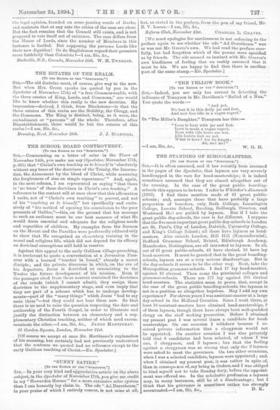THE SCHOOL BOARD CONTROVERSY.
[To THE EDITOR Or THE "SPECTATOR.""] 'SIR,—Commenting on a letter of mine in the Times of November 14th, you make me say (Spectator, November 17th, p. 685) that " Christ's own teething as to himself is' absolutely without any trace of the doctrines of the Trinity, the Incarna- tion, the Atonement by the blood of Christ, while assuming the forgiveness of sins on simple repentance.' " And, again, in the next column, I am represented as saying " that there is no trace' of these doctrines in Christ's own teaching." A reference to the context will at once show that this affirmation 1 make, not of " Christ's own teaching" in general, and not of his "teaching as to himself," but specifically and exclu- sively of " his method of opening his commission to the poor peasants of Galilee,"—this, on the ground that his message to such an audience must be our best measure of what He would deem essential and adequate for the religious needs and capacities of children. My examples from the Sermon on the Mount and the Parables were professedly adduced only to show that He recognised an elonentary training in the moral and religious life, which did not depend for its efficacy on doctrinal conceptions still held in reserve.
Against this appeal to the early Galilean village-preaching, at is irrelevant to quote a conversation at a Jerusalem Pass- ever with a learned "teacher in Israel," already a secret disciple ; and the private discourse in which, on the eve of his departure, Jesus is described as committing to the 'Twelve the future development of his mission. Even if the passages cited from these sources contained the doctrines of the creeds (which I cannot admit), they assign these doctrines to the supplementary stage, and even imply that they are part of a scheme which has to undergo develop- ments—part of the "many things" which Jesus "had to say unto them "—but they could not bear them now. So that there is no need to raise the question respecting the date and authorship of the Fourth Gospel, in order to illustrate and justify the distinction between an elementary and a sup- plementary Christian teaching, neither of which need excom- municate the other.—I am, Sir, 8to., JAMES MARTINEAU.
35 Gordon Square, London, November 21st.
[Of course we accept at once Dr. Martineau's explanation of his meaning, but certainly had not previously understood that the sentence we quoted had no reference except to the early Galilean teaching of Christ.—ED. Spectator.]






































 Previous page
Previous page